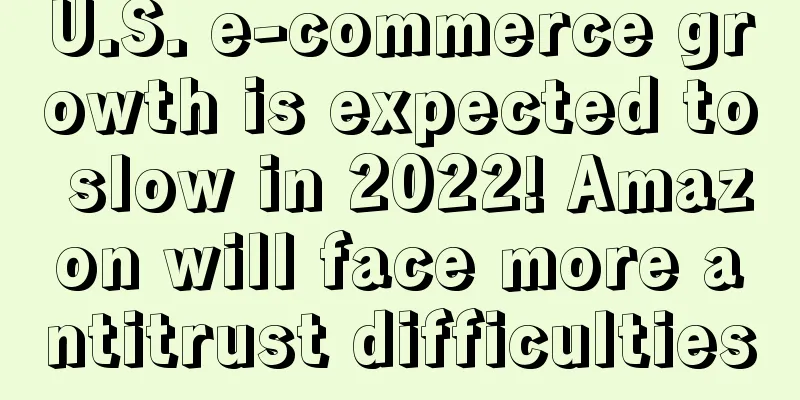U.S. e-commerce growth is expected to slow in 2022! Amazon will face more antitrust difficulties

|
It is learned that the Internet data analysis company DigitalCommerce360 recently released its forecast for the US e-commerce market in 2022, with highlights including the slowdown in e-commerce growth, the federal government's strengthening of Amazon's monopoly supervision, and inflation becoming the next hot issue. E-commerce growth slows According to the 2021 US e-commerce market report recently released by DigitalCommerce360, US online sales will increase by 16.2% year-on-year in 2021, but this is a slowdown compared to the year-on-year growth of 31.8% in 2020. DigitalCommerce360's research indicates that the growth rate of the U.S. e-commerce market will continue to normalize in 2022. The report states: "Everything is slowing down, and this situation will continue. In 2022, U.S. online sales are expected to grow by about 14% year-on-year." Online retailers further venture into new business models DigitalCommerce360 reports that other changes U.S. online retailers will make in 2022 to win the competition are investing in new business models, such as launching their own marketplaces, selling used goods, or testing buyback/trade-in programs. Several top online retailers will enter the space in 2021, and the model is attractive to retailers who want to offer a wider variety of inventory without the responsibilities associated with sourcing. Especially given that many younger consumers are concerned about sustainable products and aversion to fast fashion, which is associated with negative environmental impacts and ethically questionable labor practices, retailers will turn to testing new business models designed to address some of these issues. Supply chain issues will improve DigitalCommerce360 predicts that supply chain problems in the U.S. e-commerce market will gradually improve in the second half of 2022, and factories and ports will gradually return to normal after the holidays, unless the new coronavirus makes a large-scale comeback. Inflation will become the new hot topic The U.S. is now experiencing its highest inflation in nearly 40 years. The consumer price index in November was 6.8% higher than a year earlier, likely reflecting increased supply chain costs and constraints. Inflation will impact the retail industry in a number of ways heading into 2022. Commodity price inflation leads to wage inflationary pressures, which could be disastrous for retailers who are already paying high prices to hire employees. Unless the economy falls into a recession, these higher prices are likely to remain. The wedding boom and Amazon's antitrust woes Other trends DigitalCommerce360 is watching for in 2022 are a wedding boom, more antitrust woes for Amazon. 2022 will be a year of wedding-related shopping, including formal wear. Moreover, 2022 may not be a very friendly year for Amazon. The Biden administration has assembled a team of anti-Amazon antitrust advocates who will try to curtail Amazon's power through legal challenges in 2022 that will continue long after Joe Biden leaves the White House. Editor ✎ Xiao Zhu/ Disclaimer: This article is copyrighted and may not be reproduced without permission. |
Recommend
What is HACCP? HACCP Review
HACCP is the abbreviation of Hazard Analysis Criti...
Shopify adds new payment terms for draft orders
It is learned that recently, Shopify officially an...
Sales of this type of products have surged! How to prepare for node products in advance
The hottest topic these days is the Tokyo Olympic...
Walmart+ subscriptions exceed 32 million! 33% of members earn more than $100,000 a year!
According to a monthly survey of consumers by a st...
Recommended: 5 Amazon product selection analysis tools commonly used by overseas sellers
Amazon sellers, are you worried that no one is in...
Caught off guard! All export goods were stopped from loading, and a large number of FBA goods were abandoned
Recently, the international logistics situation ha...
With annual sales of over 100 million US dollars, cross-border home furnishings are selling like hot cakes and are about to go public!
As of 2023, although the cross-border e-commerce i...
I lost all my savings after working on Amazon for three years and had to start all over again. Can anyone tell me what are the key elements to success when working on your own? I hope I can start a second career in the future!
Anonymous user My C position Recently I read seve...
What is rebeccaminkoff? rebeccaminkoff review
Rebecca Minkoff is an emerging fashion designer ba...
What is eBay Authenticate? eBay Authenticate Review
eBay officially launched the eBay Authenticate ser...
Do you understand the integrated Amazon ads?
What big moves has Amazon made recently? Then the ...
What is ASOS? ASOS Review
ASOS (AsSeenOnScreen) is a global online retailer ...
Amazon operating salaries plummet? New changes in the cross-border recruitment market!
It is the peak recruitment season of September and...
Put this on and your orders will explode on Primeday!
Primeday is coming soon Friends, are you all read...









